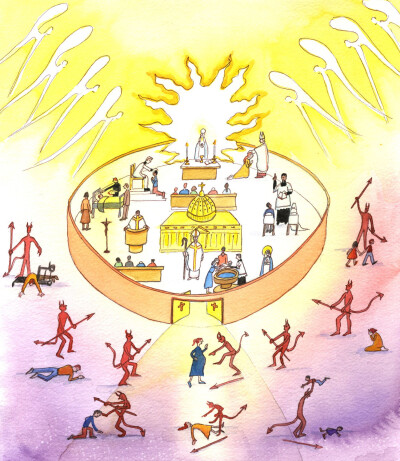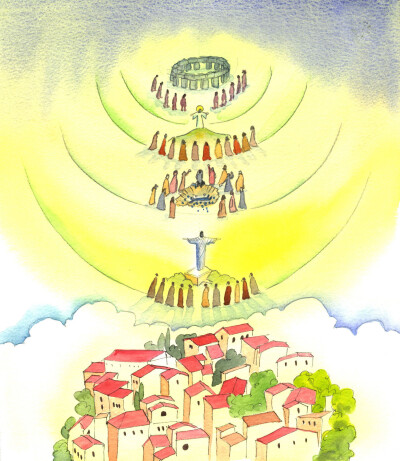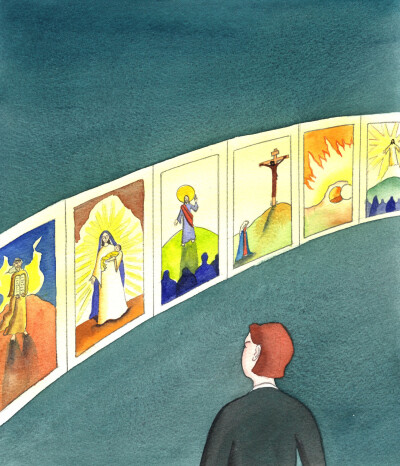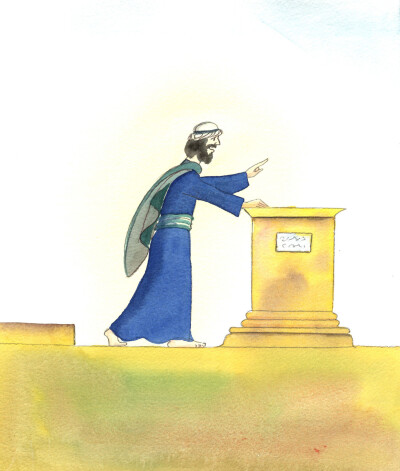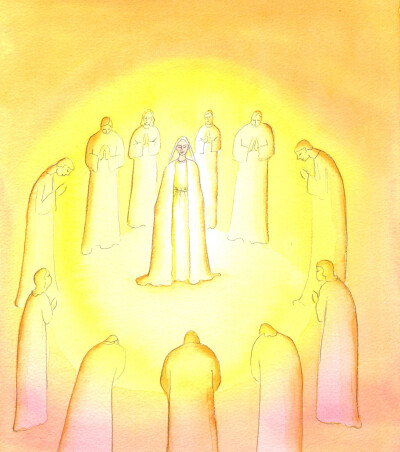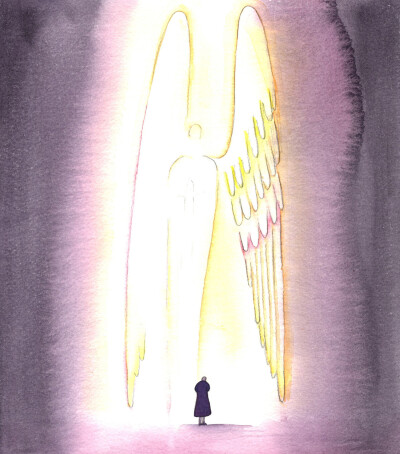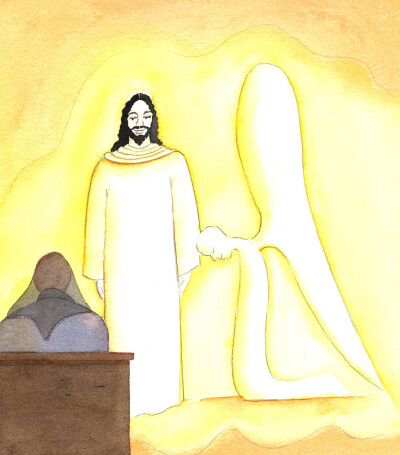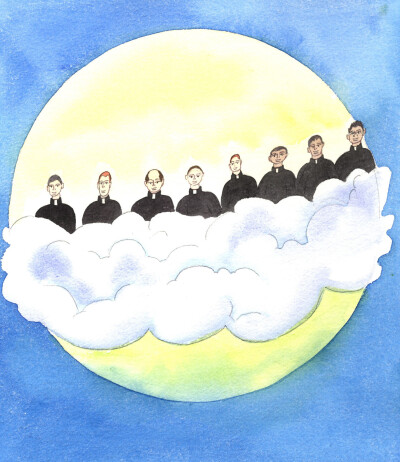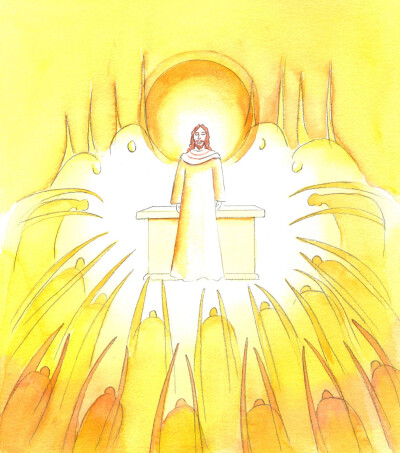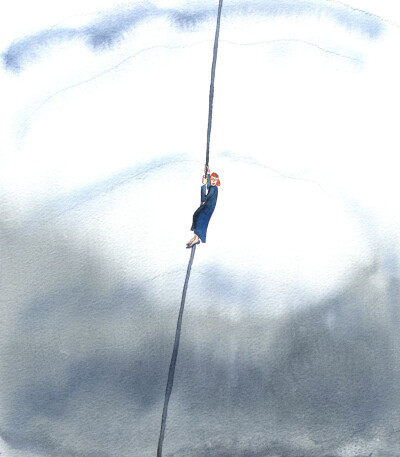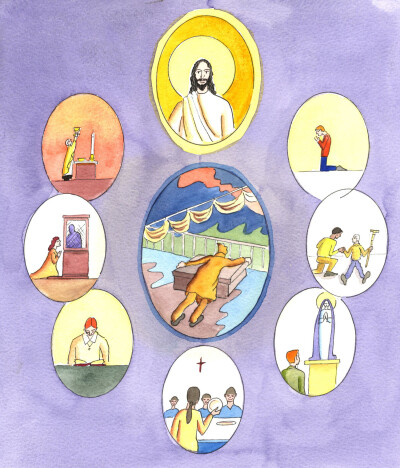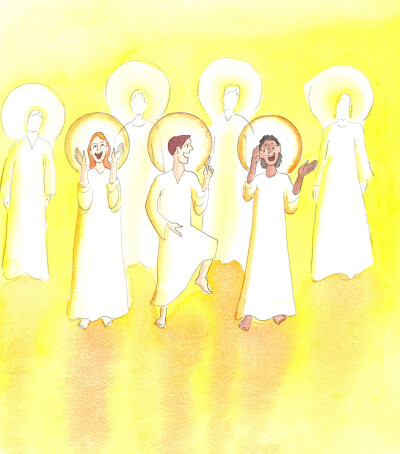Search Page
Showing 301 - 320 of 325
Though we do not usually see them, the Saints and Angels are very close to us, urging us on, as we follow the path to Heaven in this dark world. They delight in our successes in the spiritual life. Their companionship is not enjoyed by people who take the wrong path which leads down low, as if into a ditch, as they try to hide their sins from God.
The Angels look on with joy, to see their Lord, Jesus Christ, adored. This is true whether the venue of the Mass is a tent or a Cathedral, or whether Christ is being adored in the Mass, or in the tabernacle - or enthroned in the monstrance, for Adoration and Benediction.
Christ told His followers: "Ask the Lord of the Harvest to send labourers to the Harvest". He did not say: "It doesn't matter if people don't hear about the Kingdom, or never hear about the importance of Baptism". Dialogue, today, with people of various religions must never be seen as a substitute for Evangelisation and Mission, which Christ always wants His people to undertake.
The Church is like a city with St. Peter's basilica at the centre. There are demons outside the city, attacking people, as they cry out for mercy. Yet there are angels guarding the city and its inhabitants. The Church is guaranteed God's help and protection, through the power of the sacraments, the wise guidance of the Angels, the frequent blessing by the Clergy, and the prayers of the Baptised.
God asks us: 'In how many Catholic homes is the Faith really practiced?' All who work to share the Faith should be certain that God is pleased with their efforts. Change and decline alternate with stable periods of joy, in human history. We can picture, in one age, pagan worship at Stonehenge, but then the life and work of Christ - followed by the stoning of St. Stephen, and, much later, a triumphant sculpture of Christ placed on high in Rio di Janeiro. And today? Weak faith, again, in very many places.
Anyone who speaks for Christ, in everyday evangelisation, or a special mission, should set a good example, and should be free from the 'burdens' of anxiety, or personal plans, or great worries - or great possessions. Simplicity of life should be the aim, so that he or she can do the Lord's work unhindered.
People who spread the Faith, working to draw others from sinful acts and ways of life are acting, in the moral sphere, are as if drawing people away from a street that moves so swiftly downwards that people inevitably fall or crash. Of course, indirect evangelisation too is valuable, through good example, faithful work, and prayers and penances.
It is a marvellous thing, to teach, preach or evangelise. Just as there are dark streets and alleys where no-one feels safe, and sensible people are glad to be shown the way to the well-lit reads nearby, so, in the moral sphere, wise people respond to any invitation to leave the dark paths on which they walk at present, to enter the Way of Christ, which is the sure way to Heaven, lit by Divine Light.
If we are moving towards Christ, Heaven, and holiness, cheered on by the Holy Angels, we shan't make much progress if we are still picking quarrels with other children of God, or refusing to forgive.
It might seem as if a viper has leaped out from his lair, to wound us. If we work for Christ, spreading the Gospel, we are going to be opposed, by people on earth and by Satan. We are wise if we recognise the truth, that harsh words or actions which cause us to suffer are caused by people acting from their sinful nature, as we sometimes do; so we forgive them, and turn to God for the courage to go on.
Faith is a gift from God, but it comes when people who have heard the story of God's action proclaimed, accept the grace to believe it. That story or proclamation is about God's plan of Salvation. It includes His gradual Revelation of Himself to Abraham, Moses, and others, and His Revelation in His Son, Jesus Christ, who is God-made-man, and who lived on earth, and died, and rose from the dead, to conquer sin and death, to save sinners.
St. Paul spoke, by the altar of the 'Unknown God'. Like St. Paul, we should admire the efforts of people of other religions to search for God; yet like him, we should seize opportunities of telling people who have never heard the good news, about what God has done for us, in love for us, through Jesus Christ, who came through Mary.
The Saints and Angels stand around Our Blessed Lady now, in Heaven, in awe of her privileges -- her Immaculate Conception, and her Assumption into Heaven - and in awe of her amazing holiness; yet she is as simple as a child, and kind, like her son, Jesus. We must not be afraid to approach her, to celebrate her feasts and to ask for her prayers.
The Church reminds us, in Sacred Scripture and the Sacred Tradition, that God has given us Angels to guard us. If we are in spiritual, moral or physical danger, and call on their aid, they will help us, though we are not usually privileged to witness their presence. We are weak, and God loves to help us in all sorts of ways.
We should follow the example of the holy Angels. When Christ comes to us in Holy Communion, or when we know He is Present in the tabernacle or on the altar, our attitude should be like that of the Angels, who adore Him profoundly, in His Divinity. He is worthy of their adoration, and ours. They never leave Him alone; and we, for our part, should always show Him reverence and love.
Christ wants priests to be identifiable as priests by their clerical wear, all around the world, so that people everywhere have a means of knowing that Christ is caring for them in a special way by placing these 'other Christs' amongst them. This need not mean that priests should be confrontational - and there are exceptional circumstances where visibility is imprudent.
When the Angels bow low, in awe, at the arrival of Jesus Christ, at the Consecration, they demonstrate, by their action, their interior disposition. We can do the same. We can express our adoration and love by reverent gestures, prayers, genuflections, and also by our silence in church, and our modest clothing, and dignified bearing.
Catholics who work in mission and evangelisation can often be seen as calling out into the dark, in the heights of a great cavern, as they look down to the depths where many people are hiding away from God. Someone in this sort of Apostolate should have a burning desire to share the good news about God's love for us, about the forgiveness of sins, and about the graces made available through Christ and His Church, to bring us back to God and to prepare us for Eternity.
Just as sailors at sea know how to 'batten down the hatches' and survive in a storm, because of some basic duties and basic wisdom, so must we hold fast to some Catholic 'basics' that will help us to remain faithful in all the storms of life. We need to know and love Christ, to turn to Him in prayer and in the Sacraments, especially the Holy Sacrifice of the Mass, and Confession. If we study the Scriptures, and ask for the prayers of the Saints and Angels, and show love to our families and to the poor, we do well.
All who persevere in love, and enter heaven, find that the blind, the lame, the deaf are healed. No-one suffers shame in Heaven. All are forgiven; and they are as joyful as carefree children. And no-one is sick or disabled. They might bear visible wounds, as Jesus does; but the formerly blind now see, the lame walk, the deaf hear; and everyone - the Blessed Trinity, and all the Saints, and all the Angels - is beautiful!
Showing 301 - 320 of 325




